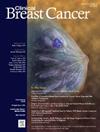Disparities in Access to Multigene Testing in Early-Stage, HR-positive, HER2-negative, Lymph Node-negative Breast Cancer
IF 2.5
3区 医学
Q2 ONCOLOGY
引用次数: 0
Abstract
Background
Multigene testing (MGT) has refined breast cancer treatment. We examined real-world access to MGT for early-stage (I-II), HR-positive, HER2-negative, node-negative breast cancer and identified factors related to disparities.
Materials and Methods
This retrospective analysis used the National Cancer Database (2007-2017). Socio-demographic and clinical-pathologic factors of interest were included in a multivariable logistic regression to examine associations with MGT use. Multiple imputation was used to find missing data.
Results
A total of N = 107,642 patients were eligible, of which 65,066 (60%) underwent MGT. The odds of undergoing MGT were lower among Black patients compared to White (OR 0.83, 95% CI, 0.79-0.87, P < .001), Hispanic compared to non-Hispanic (OR 0.91, 95% CI, 0.86-0.97, P = .004), uninsured compared to privately insured (OR 0.73,95% CI, 0.64-0.83, P < .001), and those in the West South-Central compared to New England region (OR 0.76, 95% CI, 0.70-0.82, P < .001). Increased odds were observed among those treated at an Integrated Network Cancer Program (OR 1.12, 95% CI, 1.05-1.19, P < .001), higher education level (OR 1.12, 95% CI, 1.06-1.18, P < .001), and a household income between $50,354 to $63,332 (OR 1.08, 95% CI, 1.02-1.14, P = .006). Those with access to MGT had higher odds of receiving adjuvant chemotherapy (OR 1.89,95% CI, 1.80-1.99, P < .001) and hormonal therapy (OR 3.17, 95% CI, 3.02-3.32, P < .001) compared to those without access to MGT after adjusting for other factors of interest.
Conclusions
This study highlights gaps in access to MGT in breast cancer. Ensuring equitable access to diagnostic and prognostic precision tools could positively impact the odds of receiving appropriate adjuvant therapy and improve patient outcomes.
早期、hr阳性、her2阴性、淋巴结阴性乳腺癌多基因检测可及性的差异
背景:多基因检测(MGT)改善了乳腺癌的治疗。我们调查了早期(I-II)、hr阳性、her2阴性、淋巴结阴性乳腺癌患者获得MGT的实际情况,并确定了与差异相关的因素。材料和方法:本回顾性分析使用了国家癌症数据库(2007-2017)。社会人口学和临床病理因素被纳入多变量逻辑回归,以检查与MGT使用的关系。采用多重插值法寻找缺失数据。结果:共有N = 107,642例患者符合条件,其中65,066例(60%)接受了MGT。黑人患者与白人患者相比(OR 0.83, 95% CI, 0.79-0.87, P < 0.001),西班牙裔患者与非西班牙裔患者相比(OR 0.91, 95% CI, 0.86-0.97, P = 0.004),未保险患者与私人保险患者相比(OR 0.73,95% CI, 0.64-0.83, P < 0.001),西南中南部患者与新英格兰地区患者相比(OR 0.76, 95% CI, 0.70-0.82, P < 0.001),接受MGT的几率较低。在综合网络癌症项目(OR 1.12, 95% CI, 1.05-1.19, P < .001)、高等教育水平(OR 1.12, 95% CI, 1.06-1.18, P < .001)和家庭收入在50,354美元至63,332美元之间(OR 1.08, 95% CI, 1.02-1.14, P = .006)的患者中观察到几率增加。在调整其他相关因素后,接受MGT治疗的患者接受辅助化疗(OR 1.89,95% CI, 1.80-1.99, P < 0.001)和激素治疗(OR 3.17, 95% CI, 3.02-3.32, P < 0.001)的几率高于未接受MGT治疗的患者。结论:这项研究突出了乳腺癌获得MGT的差距。确保公平获得诊断和预后精确工具可以积极影响接受适当辅助治疗的几率,并改善患者的预后。
本文章由计算机程序翻译,如有差异,请以英文原文为准。
求助全文
约1分钟内获得全文
求助全文
来源期刊

Clinical breast cancer
医学-肿瘤学
CiteScore
5.40
自引率
3.20%
发文量
174
审稿时长
48 days
期刊介绍:
Clinical Breast Cancer is a peer-reviewed bimonthly journal that publishes original articles describing various aspects of clinical and translational research of breast cancer. Clinical Breast Cancer is devoted to articles on detection, diagnosis, prevention, and treatment of breast cancer. The main emphasis is on recent scientific developments in all areas related to breast cancer. Specific areas of interest include clinical research reports from various therapeutic modalities, cancer genetics, drug sensitivity and resistance, novel imaging, tumor genomics, biomarkers, and chemoprevention strategies.
 求助内容:
求助内容: 应助结果提醒方式:
应助结果提醒方式:


